Latest News
If Not for the Library
Posted by on June 17, 2013 at 6:15 PM EDTSue Considine is being honored as a White House Champion of Change for her leadership and commitment to libraries and museums around the United States.
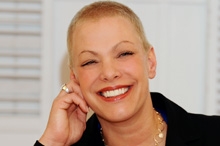
At the Fayetteville Free Library (FFL) we have redefined what a public library is, what public library staff can do, and how the public library engages the community. We are notable for our culture of innovation, our relentless curiosity, and our commitment to creating leadership opportunities at all levels of our unique, collaborative, ever-evolving organization. As our reputation has grown, the FFL has been featured in articles, publications and webinars as an example of what a public library can be when strong leadership, intuitive service, and risk-taking all align with community engagement at the forefront.
The FFL has a rich history of supporting the community’s needs by responding with user-driven, user-defined, custom crafted services. The library was uniquely positioned to respond when “Making” in libraries became a topic of discussion and exploration. The FFL quickly embraced the idea of integrating emerging technologies—even if disruptive--into our services, intuitively understanding that our mission is to create access: to spaces, to content, to technologies, and to each other.
With the launch of the FFL’s labs, the digital media Creation Lab and the fabrication and making FFL Fab Lab , library staff members raised the bar for customized access and services. Through the library’s Borrow-a-Bot program, for example, groups and individuals can make a one-on-one appointment with an FFL team member to learn about 3D design software and 3D printing. The FFL is the community’s only source of access to this wildly popularly new technology and software. By participating in programs at the FFL Fab Lab, patrons become certified “FFL Makers” and this impressive distinction is added to their patron card and account. All staff members also have the knowledge base to execute training sessions in the library’s digital media lab. Community members find having access to this cutting-edge technology is exciting and empowering and use it to come together to create, make and learn.
Learn more about EducationLibrary Programs Tailored for a Tribal Community
Posted by on June 17, 2013 at 6:13 PM EDTSandy Tharp-Thee is being honored as a White House Champion of Change for her leadership and commitment to libraries and museums around the United States.
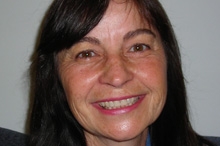
In August of 2009, I was a new tribal librarian and soon learned I had no programs, no budget, no mission statement, no online resources, no circulation system, and no manual. The library had a strong collection of books and materials about the Ioway and Native Americans but only about 150 well-loved children’s books. It also had two big red chairs. One of them had a sign taped on it that said, “Do not sit on this. It is broken.”
I first addressed the need to get books into the hands of children and youth. I called local thrift stores and received over 13 boxes of children’s books. Storytime and Lapsit programs were created. “Read, Get Wacky, Go Feather,” a youth reading program with food coupons provided by the local Sonic Drive-In (food helps!), and a Summer Reading Program with the Oklahoma Department of Libraries—our new best friends-- quickly followed. Many of the youth did not have books at home. Working with the Oklahoma Department of Libraries and First Book, I was able to help them start home libraries. Several free book fairs were held at our library, and we began an ongoing free book shelf. An American Library Association Bookshelf and a Libri Foundation Grant were received, and, for the first time, the library collection included brand new books for the youth to check out.
I found resources for other children and youth programs. “Writers in the Wind” is our adult writers’ group that meets once a month at the library. The “Writers” are creative people and are willing to share by reading or singing to children and giving book talks. One of the writers shared her therapy dog with us, and words cannot begin to express the impact on the children. The library works closely with the Johnson O’Malley program for Native youth to provide afterschool tutoring. A “Moving Library” was created with Four Winds Child Development Center to provide them with board books, and I created “Fun in a Sack,” an early literacy bag for families and teachers, with books, puzzles, and activities. Other library programs include cultural activities, field trips, and gardening. The Iowa Tribe has an Eagle Aviary, where injured eagles are rehabilitated and fishing for the eagles is another very popular program and good for the eagles.
Learn more about EducationPassion to Learn
Posted by on June 17, 2013 at 6:00 PM EDTLeslie Bushara is being honored as a White House Champion of Change for her leadership and commitment to libraries and museums around the United States.
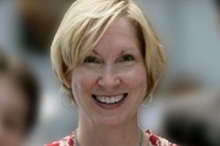
The Children’s Museums of Manhattan (CMOM) aims to inspire the next generation of thinkers, dreamers, and creators. My work at the museum over the past eighteen years has given me incredible opportunities to see firsthand the impact of the museum’s interactive exhibits, educational curricula, and outreach programs on families both within and far beyond the museum walls.
I am particularly moved by the story of a young single mother, Angelica, and her 4-year-old son, Jose, who, after six months participating in our Head Start program, ventured beyond their South Bronx neighborhood for the first time and came to Manhattan to attend a cooking workshop at the museum. For Angelica and Jose this was a day of many firsts—their first trip to Manhattan, their first trip to a museum, and the first time either had tried broccoli! Since then Angelica has become an inspired cook, seeking out healthy recipes to try with Jose.
At CMOM, much of our work is about these first experiences. This is evident in PlayWorks™, CMOM’s early childhood exhibit on preschool readiness and language development that features Alphie, the talking dragon who eats alphabet letters! Alphie was inspired by the museum’s literacy work with young, homeless mothers. The mothers often told me they couldn’t “teach” literacy skills or help their children learn vocabulary. Alphie provides them an unusual, unintimidating way to engage in language play that opens the door to enjoying books.
Learn more about EducationEmpowering New Americans
Posted by on June 17, 2013 at 5:56 PM EDTJennifer Manley is being honored as a White House Champion of Change for her leadership and commitment to libraries and museums around the United States.
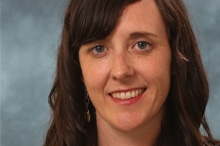
At the heart of my work in public service has always been a drive to help tell the stories of those who need to be heard. Its built on the notion that fostering strong connections between people and policy makers, those quiet voices can be amplified, and ultimately, problems can be solved; lives can be changed.
This is a pretty tall order. But when working with the right organization and the right partners, I have seen, first hand, that it is achievable. We can make a true difference, even if it is just in one person’s life, on one person’s block. Ultimately, we can make America, and the world, a better place.
It is why I am so honored to be recognized as a White House Champion of Change. I am privileged to work for Queens Library, where opportunities abound to elevate and enrich lives in positive and sustainable ways every single day.
In my role heading the Government and Community Affairs Department, I am charged with fostering positive relationships with all our stakeholders in government, while also responding to the diverse and changing needs of the populations we serve. At a time when we are embracing a new digital information era, when learning is becoming a lifelong pursuit, not simply institutional based endeavor, the role that libraries play in people’s lives in is simply transformative. It is my challenge and privilege to make sure that story is being told.
Learn more about EducationUnlocking Opportunities with Digital Literacy
Posted by on June 17, 2013 at 5:41 PM EDTJamie Hollier is being honored as a White House Champion of Change for her leadership and commitment to libraries and museums around the United States.

Many Americans are missing out on the benefits of digital literacy; one in five Americans, roughly 62 million people, doesn’t use the Internet. Their reasons include not knowing how, lack of affordable access to computers and the Internet, and simply not seeing the value of being online. This digital divide is causing increasing inequality, including decreased access to education, jobs, health information, and social inclusion. Additionally, technology is constantly changing, so digital literacy has to be seen as lifelong learning in order to make sure that people who have traditionally been marginalized are not left behind.
My involvement with digital literacy training and support began in 2008 when I was working for the Delta Public Library District on the Western slope of Colorado. During my time in that position, I became a tutor and mentor for many wonderful people in rural Delta County who were trying to catch up or keep up with the skills they needed to get a job, stay in touch with loved ones, and further their education. In 2010, I lucked my way into a speech by Vice President Biden on innovation, and as he spoke, I kept drawing connections between innovation and lifelong learning, digital literacy, and the role of libraries. Once the Vice President left the stage, I had the amazing opportunity to talk to with him for ten or fifteen minutes about the connections to digital literacy and libraries that I had drawn from his speech.
Learn more about EducationTackling Digital Citizenship
Posted by on June 17, 2013 at 5:22 PM EDTHoma Naficy is being honored as a White House Champion of Change for her leadership and commitment to libraries and museums around the United States.
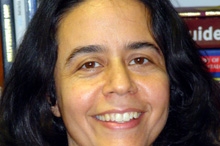
Throughout my twenty-year career working in public libraries, I’ve always been drawn to serving disenfranchised populations and connecting them to information and services. I arrived in Hartford, Connecticut, in 2000 to collaborate with dedicated staff on establishing The American Place as a multiservice center designed to welcome immigrants and to facilitate their successful transition into their new home city.
Hartford’s immigrant residents respond so positively to our center that the ESL and citizenship classes are consistently over enrolled. To this day, we host a variety of annual events honoring the rich cultural backgrounds of Hartford’s immigrant communities – which today make up almost 25 percent of the city’s population.
Our scope of services has grown over the years, yet I was struck by the fact that although a high number of our students were learning English, gaining employment, and becoming citizens, many remained apprehensive about fully engaging with the broader community around them. We realized that while direct services significantly impact immigrant integration, such integration also depends greatly on institutions creating a welcoming environment that is receptive to their cultures and experiences. Additionally, these institutions must provide resources and targeted strategies that build up the know-how necessary to participate fully at the local level.
Learn more about EducationGiving Children a Foundation for Learning
Posted by on June 17, 2013 at 4:57 PM EDTHarriet Henderson Coalter is being honored as a White House Champion of Change for her leadership and commitment to libraries and museums around the United States.
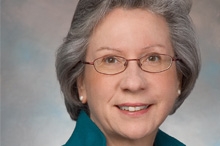
I have worked in smaller cities and in larger metropolitan areas, in communities with limited assets and in communities with abundant assets – but the issues tend to be the same. No matter where we live, people want to be secure, to be successful, to find meaningful work, and to have meaningful relationships. No matter where we start in life, unless we have a solid educational foundation, it’s almost impossible to end up as secure and successful adults. No matter the size of the community, it takes cooperation and commitment to see positive change take place.
I am fortunate to have found a career in public libraries, and through them, help establish that solid educational foundation for people.
At Richmond Public Library, we have focused on young children and their education, and have engaged with a variety of community agencies to try to improve school readiness. We have an early literacy coordinator and a parenting education coordinator who work almost entirely outside of the library. We engage parents and child care providers in the six pre-reading skills that children need to develop: print awareness, letter knowledge, phonological awareness, vocabulary, narrative skills, and print motivation. We encourage families to read, sing, write, talk, and play with their young children – all activities that help children develop these pre-reading skills. We empower parents through classes that build their knowledge of child development stages, helping them address the many challenges of raising a child.
Learn more about EducationDiversity-Centered Programming Enhances Cultural Understanding
Posted by on June 17, 2013 at 4:52 PM EDTGloria Tibbs is being honored as a White House Champion of Change for her leadership and commitment to libraries and museums around the United States.
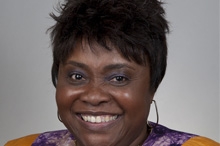
In an increasingly diverse nation it is critical that institutions of higher education engage both their on-campus population and the community at large. As the largest, most comprehensive academic research library in the Kansas City metropolitan area, the UMKC Libraries have observed this mandate and put into place numerous opportunities for students, faculty, staff, and community residents to experience meaningful interactions with each other on a number of different topics. I am honored to have helped collaboratively create programming that directly impacts the UMKC Libraries’ initiatives in community engagement.
These programs have largely been conversation-based and have focused on including a broad-based, diverse, and non-traditional series of partners that represent a cross-section of the communities we serve. The partners bring diverse perspectives, experiences, and cultures and together they produce programs with impact.
Examples of our diversity-centered programming include:
The African American Read-In – is a national literacy initiative and Black History Month program that I launched it at UMKC in 2010. It is a collaboration between university staff, faculty, even classes of inner-city high school students that brings the works of well-known authors to life. At each Read-In, several participants are brave enough to share their own creative works! Attendees report that it is a powerful experience, which is reflected in this UMKC video.
Learn more about Education
- &lsaquo previous
- …
- 74
- 75
- 76
- 77
- 78
- 79
- 80
- 81
- 82
- …
- next &rsaquo

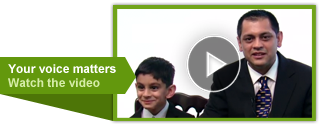
Twitter